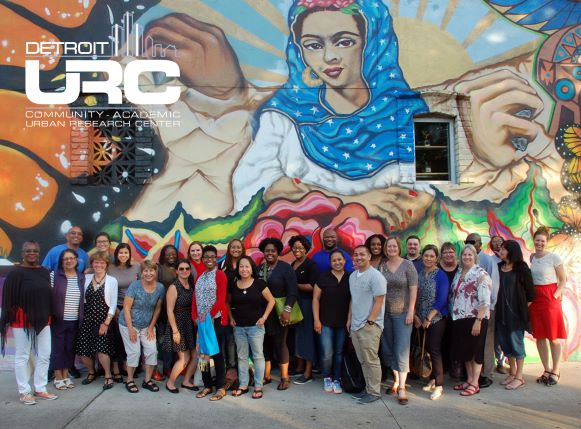Community-Based Participatory Research: A Partnership Approach for Public Health
The Detroit URC partnership is recognized as a national model for how to create and sustain university and community partnerships in addressing health issues and developing, conducting, evaluating and disseminating CBPR projects.
This online course from the Detroit URC gives researchers, health and human service practitioners, and members of community-based organizations an opportunity to learn about community-based participatory research (CBPR). This approach to research equitably involves community members, organization representatives, and academic researchers in all aspects of the research process.
This course was originally released in 2009 and peer-reviewed in 2013. Given its success as a foundational course, updates were made in 2017 for this improved, web-based 2nd edition (2018). Anyone can participate in this course at no cost. Continuing education credits are available for $21 and only available to those who have not already completed the original version of the course.
The training is divided into five sequential parts:
- Part 1: What is CBPR?
- Part 2: CBPR Partnerships
- Part 3: Conducting CBPR
- Part 4: Dissemination
- Part 5: Lessons Learned
Citation: Israel, B.A., Coombe, C.M., McGranaghan, R. (2018). Community-based participatory research: A partnership approach for public health (2nd ed.). Community Engaged Scholarship for Health, CES4Health.info, 2018.
Click here to register for the online course.
Methods for Community-Based Participatory Research for Health
Barbara A. Israel, DrPH, University of Michigan, School of Public Health;
Eugenia Eng, DrPH, University of North Carolina, Chapel Hill, School of Public Health;
Amy J. Schulz, PhD, University of Michigan, School of Public Health;
Edith A. Parker, DrPH, University of Iowa, College of Public Health
ISBN: 978-1-118-28588-6 Publication: 2012
Price: $ 64.99 Pages: 736 Jossey-Bass
This thoroughly revised and updated second edition of Methods for Community-Based Participatory Research for Health provides a step-by-step approach to the application of participatory approaches to quantitative and qualitative data collection and data analysis. With contributions from a distinguished panel of experts, this important volume shows how researchers, practitioners, and community partners can work together to establish and maintain equitable partnerships using a Community-Based Participatory Research (CBPR) approach to increase knowledge and improve the health and well-being of the communities involved.
A Bridge Between Communities: The Detroit Community-Academic Urban Research Center
Produced by The Detroit Community-Academic Urban Research Center (2000).
Video Subcommittee Alex Allen, Renee Bayer, Vivian Chavez, Maggie Floyd, Barbara Israel, Richard Lichtenstein, Robert McGranaghan.
This is a 30-minute documentary video that introduces viewers to the theory and practice of CBPR. The video tells the story of the history and activities of the URC partnership and highlights the challenges and benefits of conducting CBPR.
Detroit Community-Academic Urban Research Center Procedures for Dissemination-Related Activities
This document lists the guidelines and procedures that the Detroit URC Board agreed upon for conducting dissemination-related activities related to the overall Detroit URC. Whenever appropriate, guidelines are also provided for how the Board will coordinate with the Steering Committees of specific URC-affiliated partnerships and projects when they conduct their own dissemination activities. This document was originally adopted by the Detroit URC Board on August 30, 2000 and revised and approved on November 29, 2012, reformatted and minor updates made in November 2018.
Detroit URC Closed-Ended Survey Questionnaire for Board Evaluation, 1997-2007
Israel BA, Lantz PM, McGranaghan R, Kerr D, Guzman JR.
Methods for Conducting Community-Based Participatory Research for Health (pp. 255-257). San Frnacisoc, CA: Jossey-Bass. (2005)
Evaluation is an important part of any community-based participatory research (CBPR) partnership. Assessing the extent to which and the ways in which the partnership process is effective is a critical component of CBPR. This closed-ended survey questionnaire, developed and implemented by the Detroit URC, is one example of a tool that partnerships can use to evaluate the process and impact of the collaborative dimensions of a CBPR partnerships.
Instrument for evaluating dimensions of group dynamics within community-based participatory research partnerships
Schulz AJ, Israel BA, Lantz P.
Evaluation and Program Planning 26 (2003) 249–262.
This paper describes the development, adaptation, and use of evaluation approaches assessing key dimensions of group partnerships. A review of relevant literature describes the rationale for the evaluation of partnership dynamics, and the selection of relevant dimensions for evaluation and assessment. Three case studies are presented to illustrate the use of this evaluation instrument in community-based participatory research partnerships to assess key dimensions of partnership process. The use of evaluation results in self-assessment and partnership development are described and lessons learned in the application of these results are discussed.
Criteria for Membership on the Detroit Community-Academic Urban Research Center Board
This document lists the criteria that the Detroit URC Board agreed upon for accepting new organizations for membership onto the Detroit URC Board. The original document was adopted on August 30, 2002 and was most recently updated in 2019.




